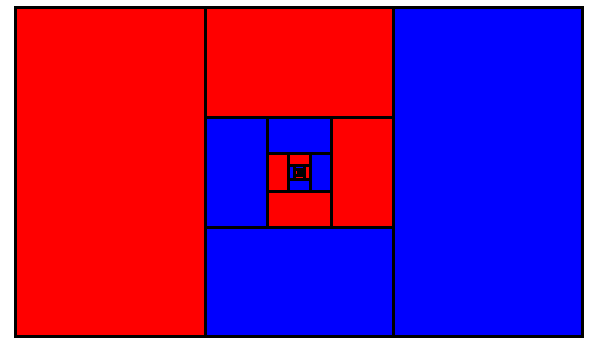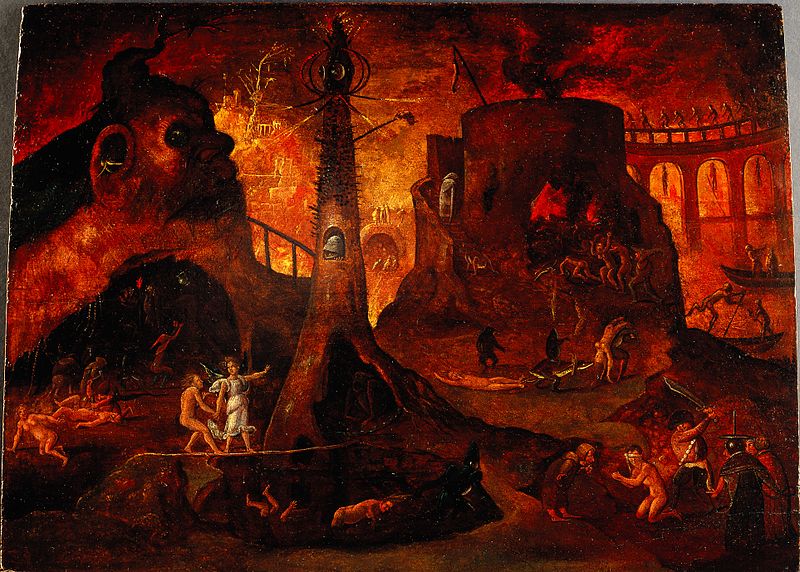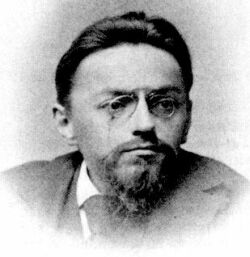
In the College Mathematics Journal in 2001, Rick Mabry published this “proof without words” that
He gives a charming explanation here.
(Rick Mabry, “Mathematics Without Words,” College Mathematics Journal 32:1 [January 2001], 19.)

In the College Mathematics Journal in 2001, Rick Mabry published this “proof without words” that
He gives a charming explanation here.
(Rick Mabry, “Mathematics Without Words,” College Mathematics Journal 32:1 [January 2001], 19.)

[A]ccording to the standard traditions, being in hell is the worst thing that could ever happen to anyone. As with less horrendous evils, the first question is how such an evil is, or could be, justified. The theological portrayals of hell make this question the most difficult for the theist to address. Ordinary pain and evil, it may be thought, can be accounted for if events in the future ‘make up for’ what leads to them, but the evil of hell leads nowhere; at no point in the future will something of value make up for the evil of hell or will some reward be granted to those who endure the suffering of hell. Hell is apparently paradigmatic as an example of truly pointless, gratuitous evil. Thus arises the problem of hell.
— Jonathan L. Kvanvig, The Problem of Hell, 1993

In 1921 Charles Steinmetz, “the electrical wizard of Schenectady,” described the conveniences of 2021:
When heating is all done electrically, and I want 70 degrees in my home, I shall set the thermostat at 70 and the temperature will not rise above that point. This temperature will be maintained uniformly regardless of the weather outside.
This will also hold true on the warm day when the temperature outside may be 90 or 100 degrees. The same electrical apparatus will cool the air, and what’s more it will also keep the humidity normal at all times.
“Look back 100 years and it is like jumping into the Dark Ages,” he wrote. “The electrical development is still in its infancy.”
(Via Reddit’s ArchivePorn.)
Edgar Rice Burroughs invented an extensive vocabulary for the Mangani, the great apes of the Tarzan novels:
afraid: utor
baboon: tongani
branch: balu-den
cave: zu-kut
country: pal
elephant: tantor
hair: b’zan
hate: ugla
jackal: ungo
lightning: ara
look: yato
love: gree-ah
mother: kalu
rhinoceros: buto
strong: zu-vo
valley: pele
water: lul
Tarzan supposed that Mangani might be the basis for the language of all creatures, because all the animals of the jungle understood it to some extent. “It sounds to man like growling and barking and grunting, punctuated at times by shrill screams, and it is practically untranslatable to any tongue known to man,” Burroughs wrote in Tarzan at the Earth’s Core.
I’m getting this from David Ullery’s The Tarzan Novels of Edgar Rice Burroughs, but there are many online dictionaries. French writer Jacques Jouet even composed a love poem in the language.
Related: In reading English books Tarzan learned to grasp each word in its entirety, but in speaking them aloud he would spell them using the names he’d invented for the letters, according to Jungle Tales of Tarzan. “Thus it was an imposing word which Tarzan made of GOD. The masculine prefix of the apes is BU, the feminine MU; g Tarzan had named LA, o he pronounced TU, and d was MO. So the word God evolved itself into BULAMUTUMUMO, or, in English, he-g-she-o-she-d.”
In a forum on Testy Copy Editors in 2009, editor Mike O’Connell posted a headline from the newspaper Japan Today: “Violinist Linked to JAL Crash Blossoms.” He asked, “what do you call these kinds of strangely phrased hedlines? is there a word for them?”
The answer suggested itself — a crash blossom is headline that’s painfully ambiguous, usually due to unwise ellipsis, double meaning, or tortured syntax. Linguist Ben Zimmer gave some examples in the New York Times the following year:
Giant Waves Down Queen Mary’s Funnel
MacArthur Flies Back to Front
Eighth Army Push Bottles Up Germans
McDonald’s Fries the Holy Grail for Potato Farmers
British Left Waffles on Falklands
Gator Attacks Puzzle Experts
And the Language Log blog lists examples from time to time:
Infant Pulled From Wrecked Car Involved in Short Police Pursuit
Letter Bombs Accused in Court
Mexico Mine Missing Declared Dead
Queen Mary Having Bottom Scraped
Two Soviet Ships Collide — One Dies
Soviet Virgin Lands Short of Goal
Smoking Riskier Than Thought
Headless Corpse Accused in Court
On Nov. 5, 1996, Election Day in the United States, the New York Times crossword puzzle carried a surprising clue:
39. Lead story in tomorrow’s newspaper (!), with 43A
43 across turned out to be ELECTED, but 39 across might be either CLINTON or BOBDOLE — both possibilities had seven letters. Was the Times venturing to guess the outcome of the day’s election?
No. Composer Jeremiah Farrell had contrived each of the seven down clues to admit of two possible answers, so that no matter which candidate won, the newspaper might claim a “correct” result.
Crossword editor Will Shortz called Farrell’s ambiguous effort his favorite puzzle of all time.
(Thanks, Andrew.)
Greed
My life is full, indeed, of gloom.
I’ve naught, you see; just this small room.
I need more wealth — that’s misery.
What joys in great renown! What glee!
The mace and throne I long to own.
No crown too grand for me alone.
Contentment
My life is full, indeed!
Of gloom I’ve naught, you see.
Just this small room I need.
More wealth? That’s misery.
What joy’s in great renown?
What glee, the mace and throne?
I long to own no crown.
Too grand for me alone.
— Mary Youngquist
(David L. Silverman, “Kickshaws,” Word Ways 5:3 [August 1972], 168-181.)
Two years ago I wrote about the number 84,672, which has a surprising property: When its name is written out in (American) English (EIGHTY FOUR THOUSAND SIX HUNDRED SEVENTY TWO) and the letter counts of those words are multiplied together (6 × 4 × 8 × 3 × 7 × 7 × 3), they yield the original number (84,672).
Such numbers are called fortuitous, and, not surprisingly, very few of them are known. When I wrote about them in 2019, the whole list ran 4, 24, 84672, 1852200, 829785600, 20910597120, 92215733299200. Now Jonathan Pappas has discovered two more:
1,239,789,303,244,800,000
ONE QUINTILLION TWO HUNDRED THIRTY NINE QUADRILLION SEVEN HUNDRED EIGHTY NINE TRILLION THREE HUNDRED THREE BILLION TWO HUNDRED FORTY FOUR MILLION EIGHT HUNDRED THOUSAND
3 × 11 × 3 × 7 × 6 × 4 × 11 × 5 × 7 × 6 × 4 × 8 × 5 × 7 × 5 × 7 × 3 × 7 × 5 × 4 × 7 × 5 × 7 × 8 = 1,239,789,303,244,800,000
887,165,996,513,213,819,259,682,435,576,627,200,000,000
EIGHT HUNDRED EIGHTY SEVEN DUODECILLION ONE HUNDRED SIXTY FIVE UNDECILLION NINE HUNDRED NINETY SIX DECILLION FIVE HUNDRED THIRTEEN NONILLION TWO HUNDRED THIRTEEN OCTILLION EIGHT HUNDRED NINETEEN SEPTILLION TWO HUNDRED FIFTY NINE SEXTILLION SIX HUNDRED EIGHTY TWO QUINTILLION FOUR HUNDRED THIRTY FIVE QUADRILLION FIVE HUNDRED SEVENTY SIX TRILLION SIX HUNDRED TWENTY SEVEN BILLION TWO HUNDRED MILLION
5 × 7 × 6 × 5 × 12 × 3 × 7 × 5 × 4 × 11 × 4 × 7 × 6 × 3 × 9 × 4 × 7 × 8 × 9 × 3 × 7 × 8 × 9 × 5 × 7 × 8 × 10 × 3 × 7 × 5 × 4 × 10 × 3 × 7 × 6 × 3 × 11 × 4 × 7 × 6 × 4 × 11 4 × 7 × 7 × 3 × 8 × 3 × 7 × 6 × 5 × 7 × 3 × 7 × 7 = 887,165,996,513,213,819,259,682,435,576,627,200,000,000
A 10th solution, if one exists, will be greater than 10138.
Details are here. Jonathan has also discovered some cyclic solutions (ONE HUNDRED SIXTY EIGHT -> FIVE HUNDRED TWENTY FIVE -> SIX HUNDRED SEVENTY TWO -> FOUR HUNDRED FORTY ONE -> FOUR HUNDRED TWENTY -> ONE HUNDRED SIXTY EIGHT) and the remarkable 195954154450774917120 -> 195954154450774917120000 -> 1959541544507749171200000.
(Thanks, Jonathan.)
Ancient Egypt was an essentially one-dimensional country strung out along the Nile, which flows from south to north. The winds were conveniently arranged to be predominantly northerly. To go north, a traveler could let his boat drift, while with a sail he could move south against the slow current. For this reason, in the writing of the ancient Egyptians, ‘go downstream (north)’ was represented by a boat without sails, and ‘go upstream (south)’ by a boat with sails. The words (and concepts) or north-south and up-downstream became merged. Since the Nile and its tributaries were the only rivers known to the ancient Egyptians, this caused no difficulties until they reached the Euphrates, which happened to flow from north to south. The resulting confusion in the ancient Egyptian mind is recorded for us to read today in their reference to ‘that inverted water which goes downstream (north) in going upstream (south).’
— P.L. Csonka, “Advanced Effects in Particle Physics,” Physical Review, April 1969, 1266-1281